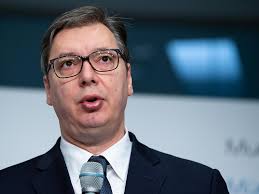Serbian President Aleksandar Vucic recently engaged in a significant phone conversation with Russian President Vladimir Putin, marking their first direct communication in over two and a half years. This dialogue occurs in the context of Vucic’s upcoming decision regarding his participation in the BRICS summit scheduled for next week. The conversation highlights the enduring relationship between Serbia and Russia, particularly amidst the geopolitical landscape shaped by the ongoing war in Ukraine. Vucic expressed gratitude for Russia’s commitment to supply adequate gas to Serbia for the upcoming winter season, underscoring the practical implications of their alliance.
Despite Serbia’s status as a candidate for European Union membership, Vucic reaffirmed the country’s position on not imposing sanctions against Russia due to the ongoing conflict in Ukraine. This statement reflects Serbia’s complex geopolitical stance, balancing its ambitions for integration into European structures with its historical ties to Russia. The Serbian leadership appears to prioritize energy security and economic considerations, as they navigate the pressures associated with their EU candidacy while maintaining strong bilateral relations with Moscow.
The phone call reflects broader implications for regional stability and the international response to Russia’s actions. As the European Union reevaluates its relationships with candidate countries, Serbia’s refusal to align with EU sanctions against Russia may complicate its aspirations for membership. Vucic’s government seems intent on preserving its autonomy in decision-making while also securing essential resources from Russia, thus showcasing a strategic approach to foreign policy that prioritizes national interests over ideological alignments.
These dynamics are particularly relevant as Vucic prepares for the BRICS summit, which could represent an important opportunity for Serbia to engage with diverse global partners, including Russia, China, and other emerging economies. Participation in such international forums may provide Serbia with alternative avenues for economic cooperation and support, which could help offset any potential consequences stemming from its EU candidacy. The BRICS summit presents a platform where Serbia can bolster its position as a regional player while navigating a multipolar world characterized by shifting alliances.
Furthermore, the context of this conversation should be viewed within the historical framework of Serbia-Russia relations, where cultural, political, and economic ties have been deeply intertwined. The agreement on gas supply is a testament to the longstanding energy partnership between the two nations, which has materialized as a crucial factor for Serbia’s energy security. As European nations grapple with energy challenges stemming from geopolitical tensions, Serbia’s reliance on Russian gas becomes a focal point of national policy, raising questions about the balance between energy dependence and geopolitical strategy.
In conclusion, Vucic’s recent dialogue with Putin encapsulates the complex interplay of national interests, energy security, and geopolitical strategy within Serbia’s foreign relations. As Serbia seeks to navigate its EU ambitions while maintaining strong ties with Russia, the decisions made in the coming weeks, particularly concerning participation in the BRICS summit, will play a vital role in shaping the future trajectory of Serbian diplomacy. The delicate balancing act between allegiance to the East and aspirations towards the West continues to define Serbia’s position in a rapidly evolving international arena.


